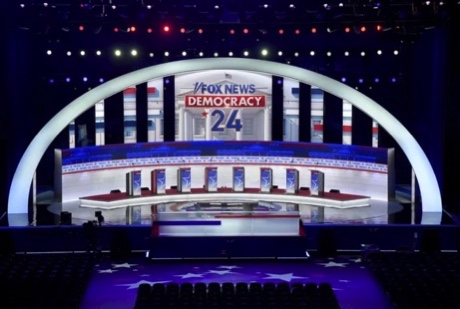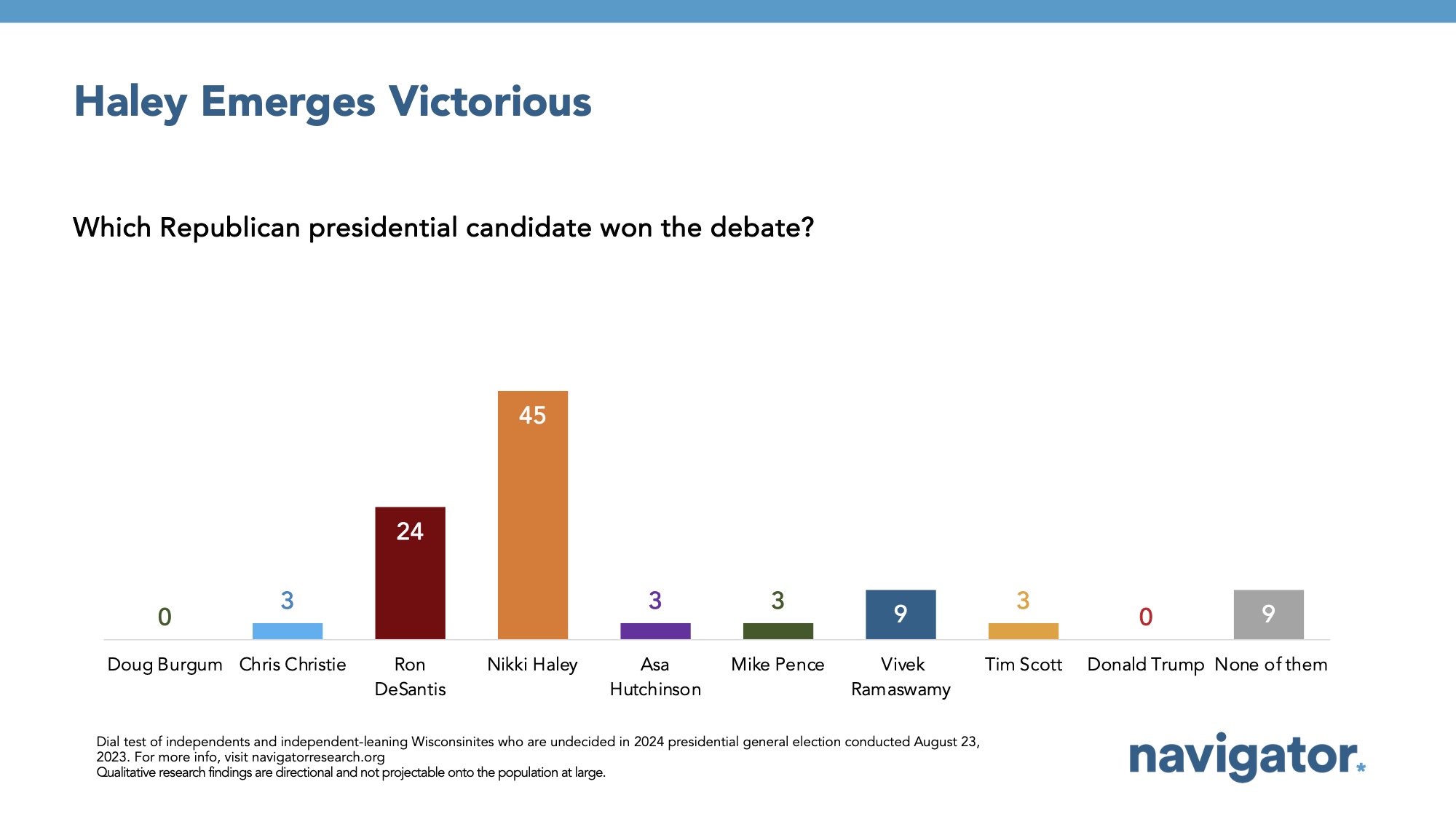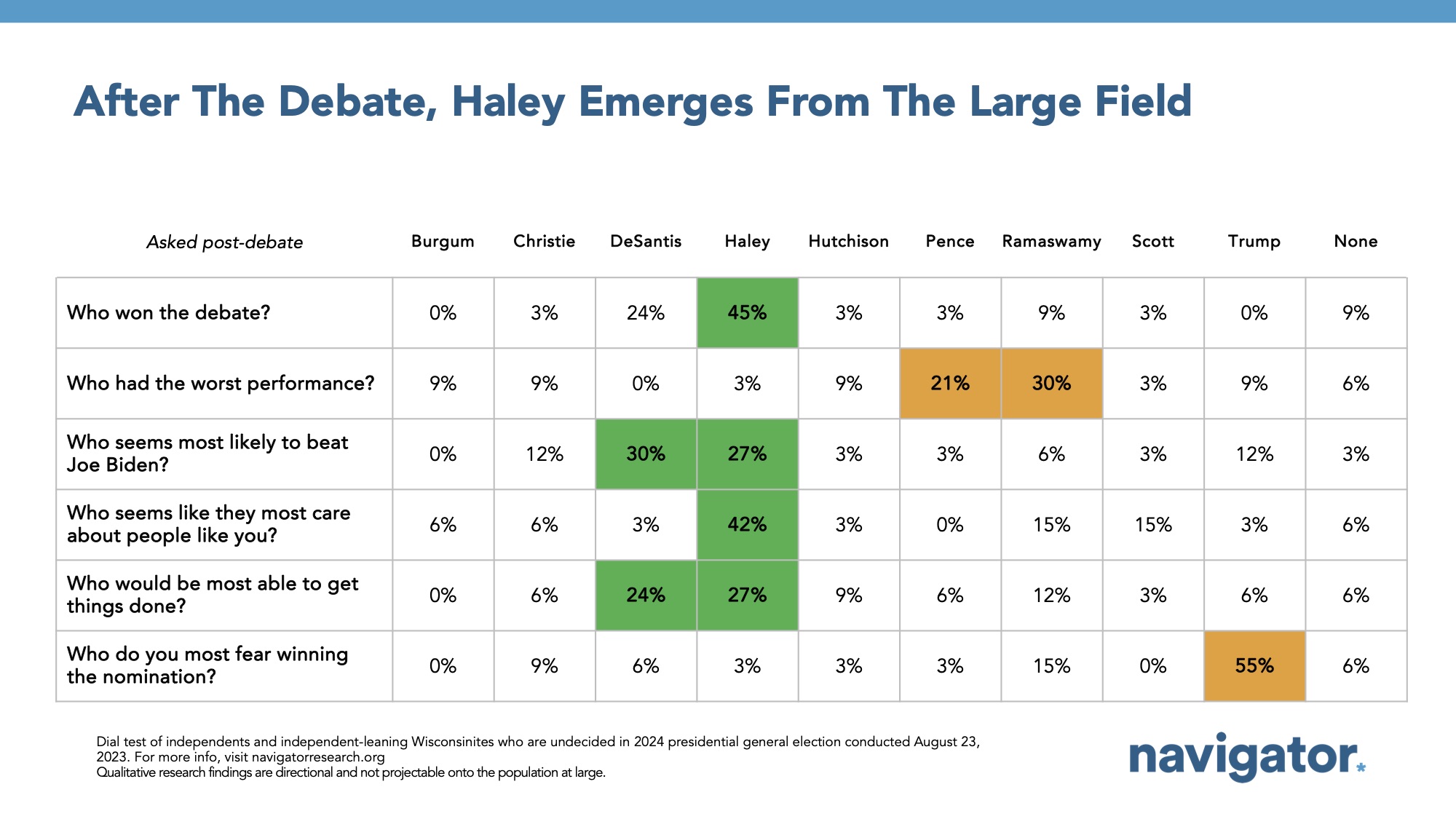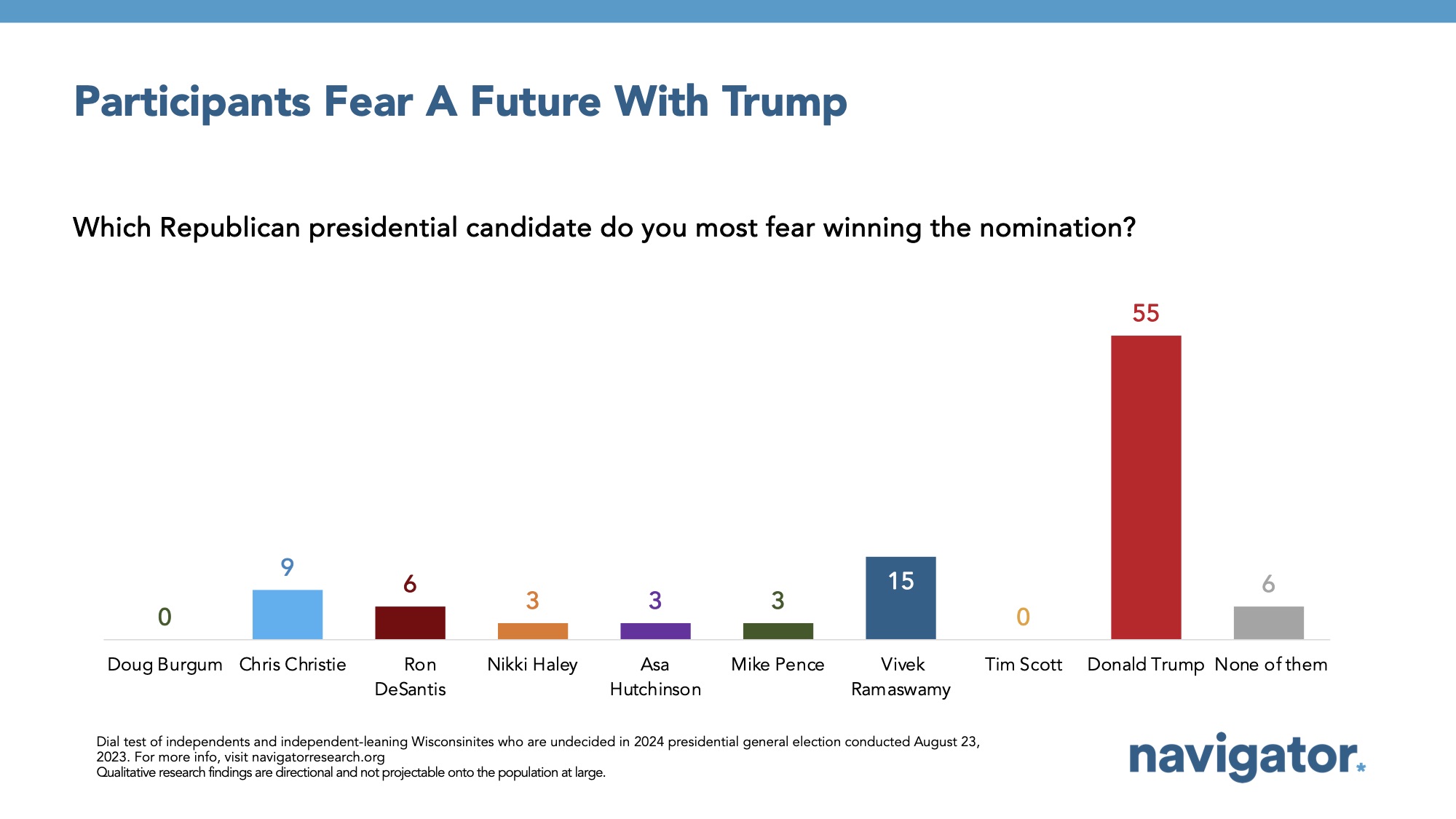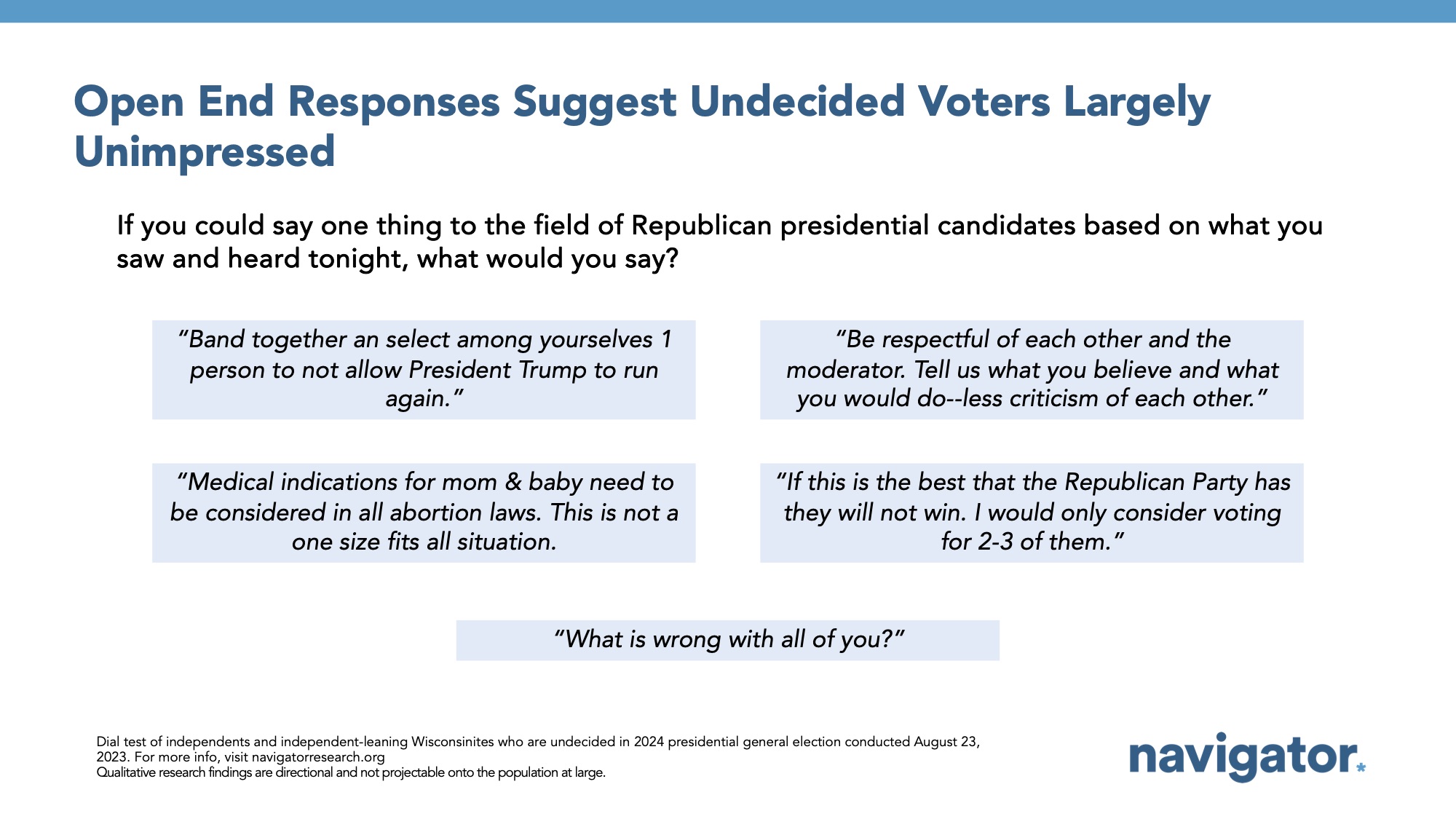Dial Groups on the First Republican Presidential Primary Debate
This Navigator Research report contains findings from a live-reaction dial group Navigator conducted in Milwaukee, Wisconsin analyzing how independents and independent-leaners who are undecided in the 2024 election responded to the first Republican presidential primary debate in real time. Over the course of the debate, 33 Wisconsinites watched the debate while holding a dial with values ranging from 0 to 100 (50 being neutral). As the candidates debated, participants continuously adjusted the dial, moving it toward 100 when they felt positively about what a candidate said and toward 0 when they felt more negatively. We’ve analyzed those reactions and distilled them into a few key findings.
The Winner: Nikki Haley
Independent participants in the dial group saw Nikki Haley as the winner of the first Republican presidential primary debate, as most responded positively to her remarks on climate change, education, and foreign policy. After the debate, most participants felt Nikki Haley won the debate (45 percent), 21 points ahead of Ron DeSantis (24 percent), the second leading candidate. Haley’s favorability rose by 24 points after the debate (from 61 percent favorable to 85 percent favorable), 18 points higher than the next most favorably-viewed candidate, Tim Scott (67 percent favorable post-debate). Haley ranked first among participants in saying she was the candidate who “seems like they care the most about people like you” (42 percent), “would be a good role model to kids” (39 percent), and “would be most able to get things done” (27 percent). When asked which candidates “seem most likely to beat Joe Biden,” participants ratings were more diffuse, with 30 percent saying Ron DeSantis, 27 percent saying Nikki Haley, and a tie between Donald Trump and Chris Christie for third (12 percent each).
Climate Change, Education, and Foreign Policy
Participants reacted positively to Haley’s stance on climate change, education, and foreign policy, especially when contrasted to Vivek Ramaswamy’s opposition to funding Ukraine aid. Dials positively went over 70 when Haley affirmed that climate change is real, while also emphasizing the solution includes lower emissions among India and China. This was a stark contrast to when the dials dropped in reaction to Vivek Ramansway calling climate change “a hoax.” Another moment that popped for Haley was her stance on education: dials rose to nearly 80 when she spoke on increasing reading remediation, parents’ influence in classrooms and bringing vocational classes into high schools. Participants also positively rated Haley’s defense of continuing to aid Ukraine when framed as the primary determinant of curbing the global influence of China and Russia. They continued to react positively when Haley railed against Ramaswamy’s lack of support for Ukraine and Taiwan when attacking his lack of foreign policy experience.



The Frontrunners for Second (Behind Trump): Ron DeSantis and Vivek Ramaswamy
Ron DeSantis and Vivek Ramswamy were the leading candidates behind Trump entering the debate among Republican primary voters, but were not as well received initially by independent participants in this dial group. DeSantis entered the night with negative opinions among these participants (net -19; 36 percent favorable – 55 percent unfavorable) and Ramaswamy came in as an unknown quantity with only 36 percent having an opinion on him (21 percent favorable – 15 percent unfavorable). By the conclusion of the debate, both candidates had net negative favorability ratings among these participants (each net -10; 45 percent favorable – 55 percent unfavorable).
- During the debate, both men showed themselves to be out of step with participants when answering questions on key issues. For example, after initially receiving positive feedback on his introduction as a businessman and disruptor coming to beat those who were “bought and paid for,” the group turned negatively on Ramaswamy with his response on the topic of climate change, where he stated “the climate change agenda is a hoax.” Immediately following this statement, the dials dropped significantly, particularly among independent women who gave him ratings as low as 20.
- Ramaswamy really never recovered from these lows: moment to moment in subsequent responses, he continued to get negative dial ratings from participants, whether it was back-and-forths with Mike Pence, claiming Trump was “the best president of the twenty-first century,” or suggesting shutting down the Department of Education.
DeSantis’s Middling Performance
DeSantis also had a middling performance in the debate among dial participants. Like Ramaswamy, he pushed these participants away with his stances on climate change and abortion in particular. DeSantis was polarizing with statements on abortion including defending the 6-week ban he signed in Florida, saying he was proud to sign the bill and support “the culture of life.” While reactions were more neutral among independent men, independent women overwhelmingly rated DeSantis’ abortion comments negatively. DeSantis’ best moments came early on when attacking the Biden administration on inflation and the economy. The high point of the debate for DeSantis came when attacking Congress on spending, saying: “We also cannot succeed. When the Congress spends trillions and trillions of dollars, those rich men north of Richmond have put us in this situation.”


The Other Candidates on the Stage
Mike Pence, Chris Christie, Tim Scott, Asa Hutchinson, and Doug Burgum scored high marks during moments throughout the debate, but did not appear to leave as much of an impression as Haley, DeSantis, or Ramaswamy. In particular, Christie, Hutchinson, and Pence each used the debate last night to make a case against Trump over his actions to overturn the election in the events leading up to the January 6th attack on the U.S. Capitol, and participants moved the dials particularly high during these moments (over 70 in some instances). However, only 12 percent of the participants selected any of these candidates as the winner of the debate, just 21 percent selected any of them as being most likely to beat President Biden in the 2024 election, and only 30 percent selected any of them as being the one that “care the most about people like you.”
- Doug Burgum, who was unknown by almost every participant who participated in this dial group, earned net favorable ratings by the conclusion of the debate (net +22; 55 percent favorable – 33 percent unfavorable). Chris Christie (52 percent favorable) and Tim Scott (67 percent favorable) also improved their ratings by double-digits among these participants (Christie from net -3 before the debate to net +30 after; Scott from net +18 to net +37). Notably, both DeSantis and Ramaswamy had lower favorability ratings than these candidates after the debate (45 percent each), scoring only higher favorability than Asa Hutchinson (42 percent) and Mike Pence (33 percent).


Donald Trump
Though former President Trump’s indictments consumed parts of the debate, Trump’s lack of attendance appeared beneficial for the other candidates. Following the debate, the independent participants said they feared Trump winning the nomination the most (55 percent) – without even hearing from him – and nearly three in four participants said they would never consider voting for Trump (73 percent). Prior to the debate, three in four participants stated that they believe Trump has committed a crime (73 percent), and a majority stated that they would like the Republican Party to make some changes and move in a new direction (55 percent), compared to 39 percent who said they want the Republican Party to continue on the path laid out by Donald Trump, but choose someone new as the leader of the party; this is similar to our latest national survey which showed 64 percent of independents want the Republican Party to make some changes and move in a new direction. Trump’s favorability began overwhelmingly net negative among these participants and remained unchanged following the debate (net -64; 18 percent favorable – 82 percent unfavorable).
- In a final open-end question, participants were asked what they would say to the Republican presidential candidates based on what they saw and heard tonight, and many expressed interest in moving past Trump, as one independent stated: “Band together and select among yourselves one person to not allow President Trump to run again.”
